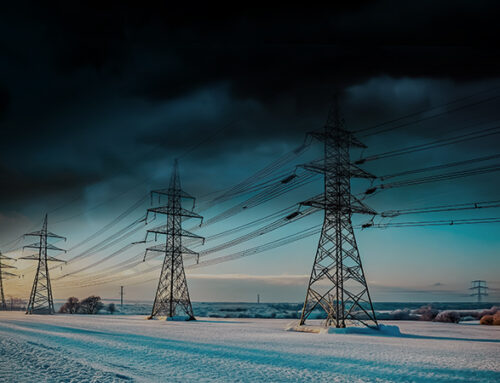Last Thursday, the UK’s Labour Party published a plan for re-nationalising Britain’s energy networks, buying them back from private investors at below-market prices. £1 billion was wiped off the value of the National Grid overnight in response to the news. Labour claims the move is necessary in order to deliver better value for the public, accelerate and co-ordinate investments in renewable and low carbon energy, provide democratic control over nationally strategic infrastructure and ensure de-centralisation occurs equitably.
“Since Thatcher’s wave of privatisations, energy network companies have been able to post huge profit margins, overcharging customers to the order of billions of pounds, and failing to invest properly in infrastructure needed to accommodate the transition to renewable energy.
Though it is possible to identify specific regulatory failings, the truth is that the current system, in which natural monopolies are run for private profit, puts regulators and, by extension the public, at a structural disadvantage. Gaming and profiteering are not remediable glitches with the current system – they are intrinsic too it. Given the challenges facing the energy system, the status quo is no longer tenable,”
– Rebecca Long Bailey, Shadow Business Secretary
What is Labour proposing?
Labour is proposing to bring the gas and electricity transmission and distribution networks into public ownership, in order to create a National Energy Agency (“NEA”) to run the high voltage transmission system, and Regional Energy Agencies (“REAs”) that would own and operate the local gas and electricity networks. There would also be Municipal Energy Agencies owning and operating local distribution and supply, devolved from the REA, and Local Energy Communities developing local renewables and operating microgrids.
The NEA would also regulate the system and set regional de-carbonisation targets, while the REAs would be responsible for meeting those targets for de-carbonising heat and electricity, as well as taking responsibility for fuel poverty (although it is unclear how that would work in relation to energy suppliers which are not in the scope of this proposal).
Labour also plans to take ownership of the UK side of the gas and electricity interconnectors with other countries.
Labour intends to use the same legal structure for bringing these assets into public ownership as was used in the nationalisations that occurred after the Second World War and that of Northern Rock – an Act of Parliament with a two-step process:
- Transfer of assets to public ownership;
- Issuance of government bonds to compensate former owners.
Labour claims that under UK law, the level of compensation would be decided by Parliament, and that Parliament “may seek to make deductions for compensation on the basis of: pension fund deficits; asset stripping since privatisation; stranded assets; the state of repair of assets; and state subsidies given to the energy companies since privatisation.” In other words, the government would seek to pay less than the market value for the shares it acquires.
Existing debts of the companies would be carried over in the process, and honoured in full.
What will it cost?
Labour has not provided a cost estimate with its plans, but it could be significant. A report by the Centre for Policy Studies last year estimated that Labour’s re-nationalisation plans (including water and rail companies and Royal Mail) would cost at least £176 billion, which would add around 10% to the national debt – or nearly £6,500 for every British household.
Speaking on Thursday, shadow business secretary Rebecca Long Bailey refused to answer ten times how much the party’s energy nationalisation plans would cost, and claimed that re-nationalising National Grid would not harm British families because most of the shareholders are foreign investors.
“Labour is playing a dangerous game with its vague plans to try and justify paying less than market value for the companies it wants to renationalise. Some utilities are already taking steps to protect themselves from it doing that, and I would expect that process to continue. It’s also worth remembering that the ones that are UK owned, like National Grid, play a role in the savings and pensions of many people and they’re not all rich,”
– James Moore, Independent newspaper

Shares in National Grid lost almost £1 billion in value after the announcement, and would lose more if this proposal became closer to reality for example with Labour winning a general election. There are more than 800,000 individual holders of National Grid shares, including many who originally bought their stake in British Gas in the 1980s. Millions more own shares through their pension funds and other investments – the Global Infrastructure Investor Association estimates that more than 5.8 million UK pension schemes are invested in Britain’s energy networks, including National Grid.
“Corbyn’s £1 billion assault on pensions: That’s how much was wiped off the value of the National Grid yesterday by his ‘Venezuela-style plot’ to nationalise the power network,”
– Daily Mail
Is it legal?
Critics compare Labour’s valuation argument with Gordon Brown’s nationalisation of Northern Rock in 2008, however that company was bankrupt at the time and the shares were arguably worthless. A better comparison would be rail network operator Railtrack, which was brought back into public ownership in 2003 with the Labour government of the time paying £2.00 a share, and was subsequently tied up in legal challenges for several years as shareholders fought for a price of £9.15 a share – the final payments to shareholders were made in March 2010, and brought the price up to £2.50 per share – a 25% increase on the initial payment. Any attempt to discount the value of the energy network companies is likely to face similar, lengthy, challenges in the courts.
Shareholdings would be replaced with government-backed bonds, meaning shareholders would become lenders, receiving interest instead of dividends. In order to make these ongoing interest payments affordable, a lower interest rate would apply, based on the lower credit risk associated with government debt. These loans would be added to the national debt of £1.8 trillion, which Labour claims would be more than offset by the value of the assets purchased.
Speaking to Utility Week, Dan Neidle, a partner at Magic Circle law firm Clifford Chance, described the plans as “silly, even childish”. He expressed concerns at the use of Northern Rock as a precedent:
“Labour thinks Northern Rock is this fantastic precedent that says the government can set any price it likes when nationalising a business, actually it is not like that at all. First of all, an obvious point, Northern Rock was bust with a market value of zero so any application of that to the very ‘not bust’ profitable utility sector is silly, even childish.
More fundamentally if you look at the legislation which nationalised Northern Rock it required that market value compensation was paid. There was an independent valuer, he conducted a proper evaluation, he had to do so on the assumption that there was to be no further government support and on that assumption he said that the market value was zero,”
– Dan Neidle, partner at firm Clifford Chance, speaking to Utility Week
He went on to point out that every single previous UK nationalisation was done at market value, and the proposal to pay investors below market value in this case may well result in an international arbitration panel intervening. Failure to pay full market value would represent an interference with property rights, which are protected by the European Convention on Human Rights.
The plans would also be contrary to many bilateral investment treaties of which the UK is a party, and that the “fastest and easiest way for a foreign investor to sue” would be by going to an international arbitration tribunal under the Energy Charter Treaty or one of the UK’s bilateral investment treaties under which investors are entitled to prompt, full market compensation, rather than going to the European Court of Human Rights.
Other legal experts agree:
“Nationalising energy networks would trigger years of litigation from both domestic and international investors impacted by broken contracts. Foreign investors might look towards pursuing action through the Energy Charter Treaty that binds signatories to rules on energy and arbitration, but UK investors would need to seek other avenues,”
– Katharine Davies, partner at Pinsent Masons”Recent announcements that a future Labour government would nationalise energy companies paying only book value compensation fail to reflect international law commitments owed to international investors in the energy sector under investment protection treaties, including the Energy Charter Treaty, which prohibit expropriation without full compensation. Because such obligations are enshrined in international treaties, they cannot be diminished by actions of the UK legislature,”
– Matthew Saunders, international arbitration partner, Ashurst.
Will investors be scared away from GB markets?
Investors are already cautious about GB energy markets given the fast pace of regulatory change, and rapidly-implemented policy decisions such as the retail price cap that have had a material impact on company valuations. The idea that private energy companies could be brought into public ownership at below market value will act as an even stronger deterrent to investors at a time when new investments are needed to deliver on the de-carbonisation agenda supported by all the major political parties.
Last year the Financial Times reported that there had been a “dramatic and worrying collapse” in investment in clean energy in the UK over the previous 3 years. Although a recent report from Octopus struck a more positive note, particularly in relation to investments in renewable generation, there are concerns about the wider attractiveness of the landscape for GB energy infrastructure investments. The House of Commons Business, Energy and Industrial Strategy Committee is currently considering submissions to its inquiry into financing energy infrastructure, after the withdrawal of the main investors in the Moorside and Wylfa Newydd nuclear projects.
Will it happen?
Before Labour could implement this policy it would need to win a General Election, and there is not one currently planned. Officially, the next General Election is not due to take place until May 2022, but could be brought forward if the Government loses a confidence motion, or an early election motion is passed by a super-majority of two-thirds of the House of Commons.
The Government is not likely to lose a confidence motion, despite not having a majority in Parliament, since it has the support of the Democratic Unionist Party (“DUP”) – this support has made the DUP more influential than it would otherwise be, a position it is unlikely to be willing to give up by turning against the Government in a confidence vote.
The alternative would be for the Government itself to bring forward an early election motion. The chances of this ebb and flow with the Brexit dramas, and it is possible that the inability of Parliament to agree on a form of Brexit might lead the Government to seek the election of a new Parliament that might do better. A more likely scenario is that the Government limps on until the new Brexit deadline in the autumn, and if a deal is agreed, the Prime Minister would step down. Her successor may decide at that point to seek a new mandate from the electorate, but there would be no obligation to do this, and they may choose to put some distance between the election and the Brexit debacle.
So Labour would have to first wait for an election to be called, and then it would have to win such an election. Both the main parties were punished in recent local elections, but these are not typically a good predictor of general election results. In normal circumstances, a government that was fumbling as badly as the current one would lose a general election, however Labour is also currently unpopular, and has largely failed to capitalise on the Government’s difficulties.
Even if Labour were to win a general election, it would then need to start implementing its programme. So far it has made a large number of policy proposals, many of which would be complex and expensive to execute. Even if energy is a high priority, when it comes to passing the necessary legislation it may find itself blocked by Parliament, particularly if there are doubts over the legality of the proposals under international treaties. The Bill could spend some time being bounced between the Lords and the Commons.
That’s a lot of “ifs”….







Could Labour be accused of attempted market manipulation – they have indicated their interest to buy NG and have released a statement that devalues the company ahead of a potential purchase – surely this is market abuse?
That’s a really interesting point. By floating the idea of a forced purchase of National Grid shares at below market value, Labour has caused the share price to fall (thereby making their supposed valuation close to the market value). That’s a bit like a “short and distort” scheme but instead of actually shorting the stock, they’ve announced an intention to buy it in the future.
However as neither Labour nor the UK government owns shares in National Grid (as far as I know, I haven’t checked), and as the information has not been issued with the intention of misleading the markets, I’m not sure that it would be classed as market abuse.
Interestingly, Thames Water added a “nationalisation event” clause into its most recent bond issue that requires immediate repayment if public ownership were to happen. I would expect National Grid to do the same.
I think there are some positives to having privately owned utility networks. From my epxerience, some of them are quite streamlined and work quickly. I like the RIIO framework for pushing along worthy investment. I worry that a nationalised system though would go back to being beaurocratic which is not what we need given the pace of change going on in the energy system. Plus, why would you buy a gas network at all at this point in time? The Government has suggested there might be an all-electric future, so it’s not a thing you would want to buy. I can’t imagine a UK Government presiding over the disassembly of the gas network, it would be painful, like when the mines were closed down.
… though the gas networks are likely to out-live any government that nationalised it, so its about would people vote for it!
To my mind there is no doubt the networks need restructuring, especially NG, who are still in too strong a position. We need a nimble set-up, so perhaps a total rethink is due.